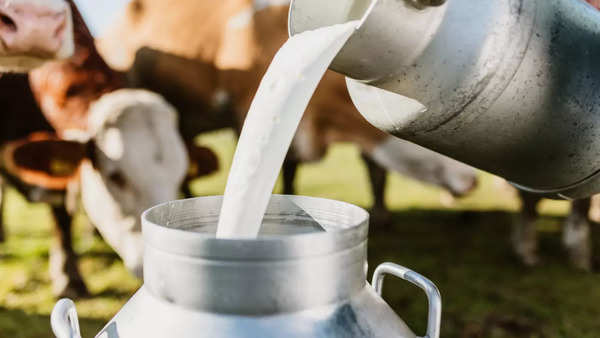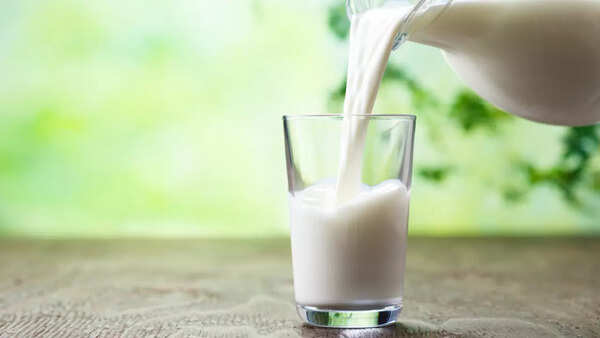Trending
Buffalo milk versus cow milk: Which one is healthier?
Cow milk and buffalo milk compared for their nutritional benefits, promoting bone health, muscle growth, immune system, heart health, weight loss. Choice based on taste, digestibility, nutritional needs, positives, negatives, regional availability, milder taste, lower fat content, creaminess, distinct flavor.

Milk is often referred to as an integral part of a nutrient-rich, balanced diet. From breakfast to dinner, it is used in different forms by us to meet the daily requirements of protein, calcium, and other essential minerals. But one question that often strikes people's minds is: which one is better and healthier—cow milk or buffalo milk? Today, we will deal with this in detail and find out the answer.Scroll down to read.
Benefits of cow milk: Take a look at its nutritional profile and benefits

Rich in nutrients: Cow milk is rich in calcium, which helps prevent osteoporosis and supports proper bone development in children. Also, cow milk is rich in protein, which provides all the essential amino acids necessary for muscle repair, growth, and overall bodily functions. It is also rich in vitamins B12, B2, and D, as well as minerals like potassium, phosphorus, and magnesium.
Also Read: 6 incredible benefits of drinking cow milk
Good for muscle growth: The high-quality protein content in cow milk aids in muscle repair and growth. It is especially beneficial for athletes and individuals engaged in regular physical activity.
Boost immune system: Nutrients such as vitamin A, zinc, and selenium in cow milk play a vital role in maintaining a healthy immune system, helping the body fight off infections.
Aids in hydration: Cow milk contains a high percentage of water (about 87%), which helps in maintaining proper hydration levels, especially after physical activities.

Improve heart health: potassium in cow milk helps regulate blood pressure by balancing the effects of sodium. Adequate potassium intake is associated with a reduced risk of cardiovascular disease. It is also said that the fatty acids in cow milk, especially those in full-fat milk, may have a neutral or even beneficial effect on heart health, though this is still a topic of ongoing research.
Good for skin: The vitamins and antioxidants present in cow milk, such as vitamin E and selenium, contribute to healthy skin by protecting it from oxidative stress and promoting a smooth, youthful appearance.
Boost weight loss: The protein content in cow milk can help promote satiety and reduce overall calorie intake, which can be beneficial for weight management. Additionally, some studies suggest that dairy consumption is associated with a reduced risk of obesity.
Good for dental health: Calcium and phosphorus in cow milk are essential for maintaining strong and healthy teeth, preventing tooth decay, and supporting overall oral health.
Benefits of buffalo milk: Take a look at its nutritional profile and benefits.

Rich in nutrients: It is said to have more protein than cow milk, which is essential for muscle repair, growth, and overall bodily functions.
Higher in fat: It has a higher fat content, which provides more energy and helps in the absorption of fat-soluble vitamins (A, D, E, and K).
Boost immunity: The higher immunoglobulin content in buffalo milk can help boost the immune system, aiding in the body's defense against infections.
Good for the heart: Buffalo milk is a good source of potassium, which helps regulate blood pressure by balancing sodium levels in the body.
Lower Cholesterol: Despite its higher fat content, buffalo milk has lower cholesterol levels compared to cow milk, making it a better option for heart health.
Good for skin: The high fat content and presence of vitamins A and E in buffalo milk can help maintain healthy, hydrated skin and promote a youthful appearance.
Supports growth and development:
Higher lactose content: The higher lactose content can be beneficial for people who can digest it, providing a quick source of energy.
Antioxidant properties: Buffalo milk contains antioxidants such as tocopherol and retinol, which help combat oxidative stress and reduce the risk of chronic diseases.
Which one is healthier?
As per experts, they both have their positives and negatives, and hence the choice of one relies on an individual's personal preferences, dietary needs, and regional availability. Some individuals may prefer the milder taste and lower fat content of cow milk, while others may opt for the creaminess and distinct flavor of buffalo milk. They both offer unique nutritional benefits, and one can choose on the basis of taste, digestibility, and specific nutritional needs.
Thumb and Embed Images Courtesy: istock
Benefits of cow milk: Take a look at its nutritional profile and benefits

Rich in nutrients: Cow milk is rich in calcium, which helps prevent osteoporosis and supports proper bone development in children. Also, cow milk is rich in protein, which provides all the essential amino acids necessary for muscle repair, growth, and overall bodily functions. It is also rich in vitamins B12, B2, and D, as well as minerals like potassium, phosphorus, and magnesium.
Promote bone health: The combination of calcium, phosphorus, and vitamin D in cow milk is crucial for maintaining strong bones and teeth, preventing bone-related disorders, and ensuring proper bone density.
Also Read: 6 incredible benefits of drinking cow milk
Good for muscle growth: The high-quality protein content in cow milk aids in muscle repair and growth. It is especially beneficial for athletes and individuals engaged in regular physical activity.
Boost immune system: Nutrients such as vitamin A, zinc, and selenium in cow milk play a vital role in maintaining a healthy immune system, helping the body fight off infections.
Aids in hydration: Cow milk contains a high percentage of water (about 87%), which helps in maintaining proper hydration levels, especially after physical activities.

Improve heart health: potassium in cow milk helps regulate blood pressure by balancing the effects of sodium. Adequate potassium intake is associated with a reduced risk of cardiovascular disease. It is also said that the fatty acids in cow milk, especially those in full-fat milk, may have a neutral or even beneficial effect on heart health, though this is still a topic of ongoing research.
Good for skin: The vitamins and antioxidants present in cow milk, such as vitamin E and selenium, contribute to healthy skin by protecting it from oxidative stress and promoting a smooth, youthful appearance.
Boost weight loss: The protein content in cow milk can help promote satiety and reduce overall calorie intake, which can be beneficial for weight management. Additionally, some studies suggest that dairy consumption is associated with a reduced risk of obesity.
Good for dental health: Calcium and phosphorus in cow milk are essential for maintaining strong and healthy teeth, preventing tooth decay, and supporting overall oral health.
Benefits of buffalo milk: Take a look at its nutritional profile and benefits.

Rich in nutrients: It is said to have more protein than cow milk, which is essential for muscle repair, growth, and overall bodily functions.
Higher in fat: It has a higher fat content, which provides more energy and helps in the absorption of fat-soluble vitamins (A, D, E, and K).
Boost immunity: The higher immunoglobulin content in buffalo milk can help boost the immune system, aiding in the body's defense against infections.
Good for the heart: Buffalo milk is a good source of potassium, which helps regulate blood pressure by balancing sodium levels in the body.
Lower Cholesterol: Despite its higher fat content, buffalo milk has lower cholesterol levels compared to cow milk, making it a better option for heart health.
Good for skin: The high fat content and presence of vitamins A and E in buffalo milk can help maintain healthy, hydrated skin and promote a youthful appearance.
Supports growth and development:
Higher lactose content: The higher lactose content can be beneficial for people who can digest it, providing a quick source of energy.
Antioxidant properties: Buffalo milk contains antioxidants such as tocopherol and retinol, which help combat oxidative stress and reduce the risk of chronic diseases.
Which one is healthier?
As per experts, they both have their positives and negatives, and hence the choice of one relies on an individual's personal preferences, dietary needs, and regional availability. Some individuals may prefer the milder taste and lower fat content of cow milk, while others may opt for the creaminess and distinct flavor of buffalo milk. They both offer unique nutritional benefits, and one can choose on the basis of taste, digestibility, and specific nutritional needs.
Thumb and Embed Images Courtesy: istock
#Shorts Jacqueline Fernandez's Almond Milk Recipe
End of Article
FOLLOW US ON SOCIAL MEDIA









